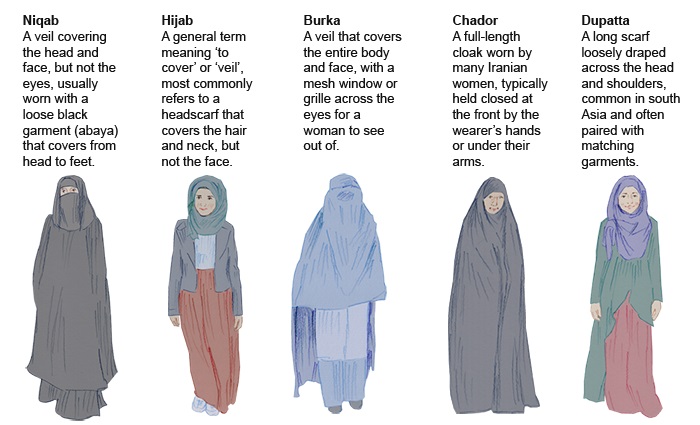Muslim Culture
Muslim is an Arabic word for one who submits.
Islam means submission.
By language, this is ambiguous.
So I will term them as Mohammedans.
It is a term they prefer to not use, however, it is ambigious for me to us.
It should be okay, since a defining trait is that they indeed have to follow Mohammed.
Important Festivals
- Id
Keywords
- Iftar
- Ramzan
- Qurbana - Ritual Sacrifice
- ibn - Son of
- Hijra: The move from Mecca to Medina
- Hijri Year: It is the calendar era used in the Islamic calendar (from 622 CE), which is based on lunar years (354-355 days a year)
- AH: Anno Hegirae (Romanized) - referring to the Islamic calendar years
Main Definitions
- Islam: Submission to Allah
- Muslim: One who submits
- Qur'an: The Recitation (of the word of Allah)
Sects of Islam
- Sunni
- Shi'a
- Ibadi (popular in Oman)
The Qur'an
- Al Qur'an, translates to the "word of god".
- Allah is the god of the world
- A Muslim is one who follows the words of Allah
- Iblis is the name of Al-Shaytan, the devil
Sections of Qur'an
The Qur'an is divided in various ways.
- Surahs - A Surah is a chapter in the Qur'an, as divided by Allah. There are 114 Surahs.
- Ayat - The verses in Qur'an.
- Manzil - It is a division based on finishing the Qur'an in 7 days.
- Juz - It's a division made to make it easier to read the Qur'an in one month, or in 30 weeks. There are 30 Juzs.
- Hizb - Each Juz can be divided into two Hizbs. There are 60 Hizbs.
- Rubu - Each Hizb is made up of four quarters, each known as a Rubu.
Other aspects
- Sunnah - The sayings and actions of Prophet Mohammed PBUH. It is used to interpret the Quran right.
- Hadith - The text that records the Sunnah. It contains both the Chain of Reports and the main text.
Other Keywords
- Deen (Religion)
- Imaan (Faith)
- Mumin (Believer)
- Muslim (Submitter)
- Fasiq (Open Sinner, Corrupt)
- Fajir (Sinner)
- Kafir (Disbeliever)
-
Munafiq (Hypocrite)
-
Maddhabs (Sects / Schools of Jurispudence) (Historically, about 19 in Sunni and Shi'a)
- Sunni / Ahl as-Sunnah wa'l Jama'ah
- Hanbali, By Imam Ahmed ibn Hanbal
- Shafi'i, By Imam Ash-Shafi'i
- Hanafi, By Imam Abu Hanifa
- Maliki, By Imam Malik
- Shi'a
- Jafari
- Ibadi
- Sufi
- Sunni / Ahl as-Sunnah wa'l Jama'ah
-
Kalam (Theology)
-
Aqidah (School of Theology)
- Ash'ari, By Sheik / Imam Abu al-Hasan al-Ash'ari**
- Maturdi, By Sheik / Imam Abu Mansur al-Maturidi**
- Athari (Literalism)
-
Pillars of Religion (Arkaan ad-Deen)
- Shahaadah (Profession of Faith)
- Salaah (Prayer)
- Zakaat (Almsgiving)
- Sawm (Fasting)
- Hajj (Pilgrimage)
- Jihaad (Struggle in the Cause of Allah) [Not Practiced Now]
-
Pillars of Beliefs (Arkaan al-Imaan)
- Tawheed (Oneness of God)
- Angels (Malai'kah)
- Revealed Books (Kutub Allah)
- Prophets (Anbiya)
- Day of Resurrection (Yawm al-Qiyaamah)
- Qadar (Predestination) / Taqdeer (Divine Decree)
-
Usul al-Fiqh (Principles of Jursipudence)
- Fiqh
- Ijma, etc.
- Ahkam (Juristic Concepts)
- Al-Ahkam Al-Khamsa (The Five Decisions in Shari'ah)
- Fard/Wajib (Compulsory)
- Mustahabb/Mandub (Recommended)
- Mubah (Neutral)
- Makruh (Disliked)
- Haram/Mahzur (Forbidden)
- Halal (Lawful)
- Jihaad (Struggle in the Cause)
- Taqiyya (A sin for greater good)
- Sunnah (Tradition)
- Tafsir (Commentary)
- Al-Ahkam Al-Khamsa (The Five Decisions in Shari'ah)
- Ulama (Scholars)
- Common Traits
- They memorize Mohammed's Qur'an, a great deal of Ahadeeth, Principles of Jurispudence (Usool al-Fiqh), Science of (Grading) Hadeeths (Uloom al-Hadeeth)
- Imam (Lead Scholar, Leads Prayer (Salat))
- Mullah (Madrasa graduate)
- Ayatollah (Scholars who lead prayers in Shia Islam)
- Mufti (Scholars who are qualified to issue Shari'ah verdict (Fatwas))
- They have to have 5 qualities of discipline, and be recommended by 70+ scholars.
- Maulana (Learned person in India)
- Alim (Learned person)
- Faqih (Someone who knows how to apply Islam, well versed in Fiqh, and follow a Madhhab)
- Sheik (Respected Old Person, student or scholar (in Egypt), or the head of a village, similar to Maulana)
- Mujtahid (A scholar qualified to perform Independent Reasoning (Ijtihad))
- Muttakalim (A scholar of Theology (Kalam))
- Common Traits
- Fiqh
-
Rulings
- Fatwas (Opinions by Muftis)
Dressing
Both men and women are required to dress modestly under Islam. But what it means for a woman to dress modestly is highly subjective, and these rules are often very oppressive towards women. Islam in particular is known to be very strict with its women followers.
Regarding the rule for women having to wear veils, in the olden times it was seen as a mark of respect aside from protection, in the same manner all three Abrahamic religions refuse to look at or draw images of god, because that is somehow seen as a sign of great respect.
In the modern day, this is obviously misused in oppressive regimes. Nowadays it is seen as disrespect to force women to cover their faces with a veil, and even Muslims have started not wearing burqas. However, Quran does demand men and women to dress modestly, rather than provocatively. While that is pretty reasonable, any sort of punishment or specific definitions to what is modest is not reasonable. I would say that here is the importance of seeing religion as the feeling of an individual becomes important (See my defintion of religion).
Also, hijabs and burqas not only the only form of modest coverings, there are others too.
Examples:
